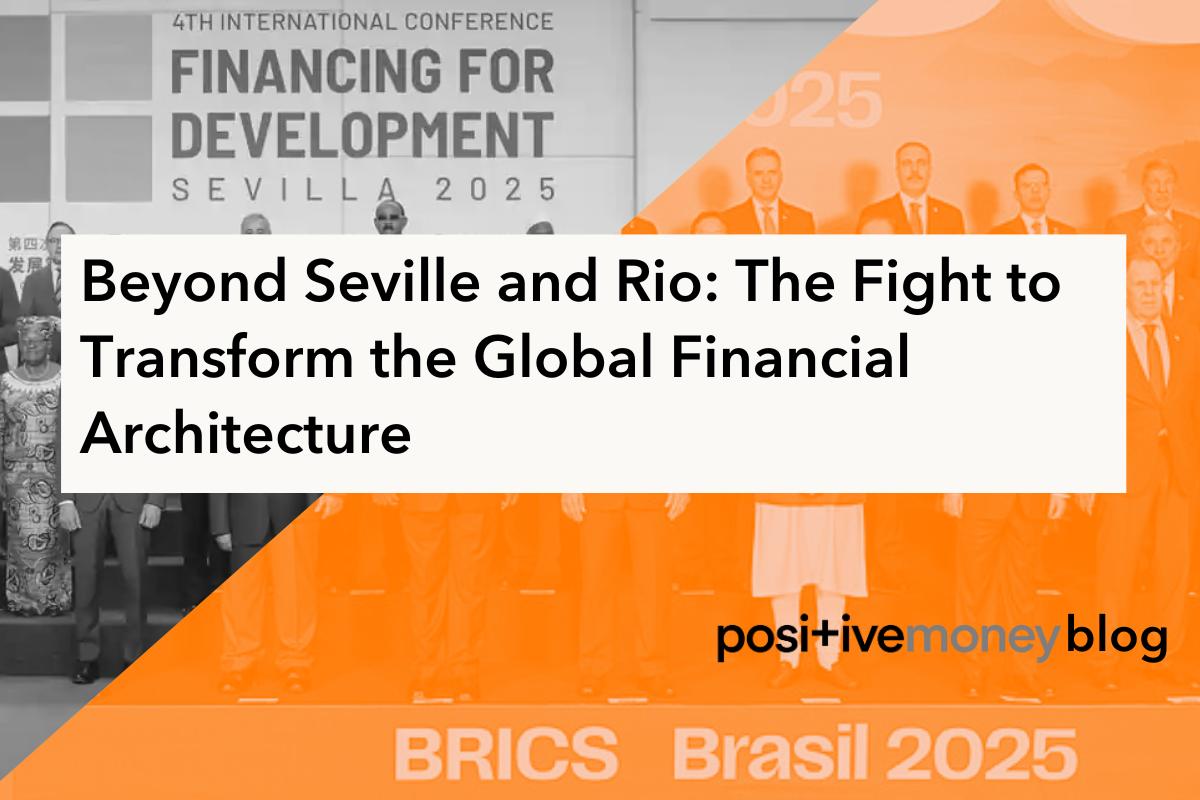
Finance and DemocracyUK
18 December 2025
The global financial system continues to fail the Global South amid mounting crises from unsustainable debt to accelerating climate breakdown. Calls to reform the financial system and to democratise its institutions were prominent at the Financing for Development Conference and the BRICS Summit, but as progress continues to stall, many Global South countries seek to build alternative financial infrastructures instead.
Two important international conferences recently took place - The UN’s fourth Financing for Development (FfD4) conference in Seville, and the 17th BRICS Summit in Rio de Janeiro. While fundamentally different in character, the unavoidable need to transform the unjust and hierarchical global financial system loomed large at both meetings. FfD4 was a missed opportunity to rewrite the rules, falling short of the bold reforms many had hoped for by leaning too heavily on private finance and old formulas. The BRICS Summit, on the other hand, reiterated appeals to democratise existing multilateral institutions but combined these calls with stated ambitions to build new financial infrastructures and institutions.
Thousands of world leaders, finance ministers, civil society organisations, and private finance representatives gathered in Seville for the UN’s once-in-a-decade summit on Financing for Development, amid a blistering heatwave. The conference marked a key moment to shape the global agenda for sustainable development finance over the next decade. But in the lead-up, negotiations were fraught, culminating in the withdrawal of the United States. Global South countries and civil society voices criticised wealthy nations for failing to grasp the scale of today’s overlapping crises, as many are cutting overseas development aid which is projected to fall by 17% in 2025. In turn, wealthy nations continued to insist on private finance as the solution, despite evidence that it rarely reaches those most in need, and rarely on fair terms, as evidenced by the clear failures of the ‘billions to trillions’ agenda imposed on the previous FfD3 in 2015 in Ethiopia.
There were some clear wins such as the headline pledge to triple the lending capacity of Multilateral Development Banks (MDBs), new commitments to integrate climate risk in national budgets and support for debt suspension during climate disasters. The launch of the Sevilla Platform for Action, featuring over 130 coalition-led initiatives, gave a renewed energy to multilateralism without the US presence. This included a commitment by 44 African countries to modernise their tax collection systems for domestic resources mobilisation, and agreement for more inclusive international tax cooperation and engagement in the UN Tax Convention framework. Yet substantive and binding commitments for global tax justice such as tackling corporate tax avoidance, and taxing multinationals and the ultra-wealthy were not secured. Finally, debt-for-development swaps gained traction, including Italy’s €230 million initiative and the new Spain–World Bank hub.
Yet these schemes risk entrenching private sector influence without addressing the root causes of unsustainable debt or closing the climate finance gap, where climate vulnerable countries still receive far less than promised and needed, much of it in the form of loans in foreign currencies and with harmful conditionalities attached. Far more action is required, as we called for alongside 80+ organisations in an open letter to Keir Starmer ahead of the summit and in supporting an action on the Southbank of the Thames in London for the Global Day of Action on Climate Finance as part of the Climate Justice Coalition, alongside hundreds of others around the world.
Image credit: Jess Hurd
There was broad consensus on the urgency of sovereign debt restructuring, but pressure from major creditor nations, particularly in the Global North, led to the watering down of key proposals. The final communiqué leaned heavily on voluntary measures, with no binding commitments to automatic restructuring or private sector participation. This failure has real consequences, with over 3.4 billion people now living in countries that spend more on interest payments than on healthcare or education. Yet, outdated legal frameworks still allow private creditors to block or delay deals that would cancel or restructure unsustainable debts. Some 90% of African sovereign bonds are governed by UK law, giving private investors enormous leverage over debt negotiations. As Joseph Stiglitz puts it, “the current debt system serves financial markets, not people”. Promisingly, the idea of forming ‘debt clubs’, coalitions of debtor countries negotiating collectively was prominent in civil society spaces, signalling growing appetite for Global South-led alternatives.
Only three days after the conclusion of the conference in Seville, the BRICS bloc of Global South nations met in Rio de Janeiro. The group has expanded significantly beyond the original founding nations of Brazil, Russia, India, China, and South Africa, with 10 member countries and 10 partner countries present at the group’s 17th Summit in Rio.
Although the expansion of BRICS brings increased economic weight and political sway, it is also likely to make it increasingly difficult to reach consensus because of the widely diverging interests of its members. However, despite the increased complexity that comes with expanded membership, ambitions to build a new financial architecture was one of the key takeaways of the summit and visibly present in the Joint Declaration.
This aligns with previous sentiments at BRICS summits, with the group often viewed as emblematic of the attempts to create a more multipolar world order. The summit host, Brazil’s President Luiz Inácio Lula da Silva, stated in one of his speeches that even if de-dollarisation efforts may be slow, the wheels are in motion and there is “no going back”.
The current global financial system is too dependent on just a few major currencies, particularly the dollar, entrenching global inequalities and worsening debt and climate crises. The increased use of local currencies for bilateral trade by BRICS members and the New Development Bank’s (NDB) target to provide 30% of its funding in local currencies by 2026 are therefore positive developments towards a more multipolar monetary system. Nonetheless, the overall financing capacities of the NDB remain low, while the Contingent Reserve Arrangement (CRA) has yet to prove in practice that it can act as a true alternative to the International Monetary Fund (IMF) by providing emergency liquidity to members in need.
Alongside renewed commitments to improve interoperability between local payment systems, the 17th BRICS Summit saw its members reiterate their support for multilateral cooperation and reforming institutions such as the IMF and the World Bank. With an increasing amount of wars and conflicts, the weaponisation of the dollar, and the unilateral sanctions and tariffs imposed by the United States, calls to reform and strengthen multilateral institutions are certainly welcome.
However, calls by Global South countries to democratise institutions such as the IMF and the World Bank have long fallen on deaf ears. The Global North have been unwilling to give up the neo-colonial tools of control within these institutions that allow them to set the terms of global trade and finance to their benefit. Given that these calls have long gone unheard, it is difficult to see why this time would be any different. On the other hand, the rapid growth of BRICS economies mean that expanding South-South bilateral trade, increasing technology transfers, and building alternative financial infrastructures becomes more practicable with each day that passes. Global South countries are increasingly advancing a green industrial cooperation agenda that is independent of financing or technology transfers from the Global North.
Amidst threats of imposing tariffs on countries that are members of BRICS, the Global North are ignoring calls for reforming the financial system and its institutions at its own peril. Global South countries are already building the foundations of a new financial architecture that is based on local currencies. As argued in Positive Money’s Beyond Dollar Dominance report, new regional payment systems, public digital money and greater development financing in local currencies can unlock much needed finance and liquidity for climate and sustainable development, and reduce systemic financial risks imposed on Global South economies. These are some of the key ways in which the Global South can reclaim the economic policy space from a system long shaped by Global North currencies and unequal power imbalances.
Our report 'Beyond Dollar Dominance' can be found here. Sign-up to our mailing list for regular updates, or donate to support our work to redesign our economic system for social justice and a liveable planet.
